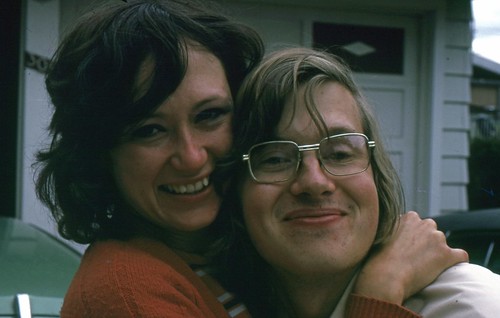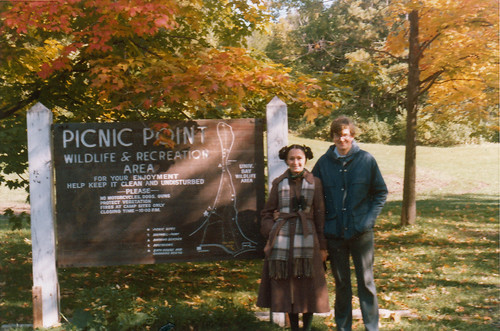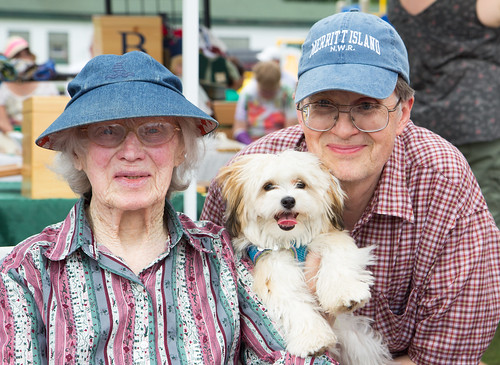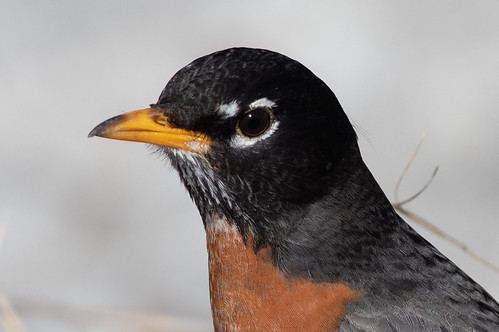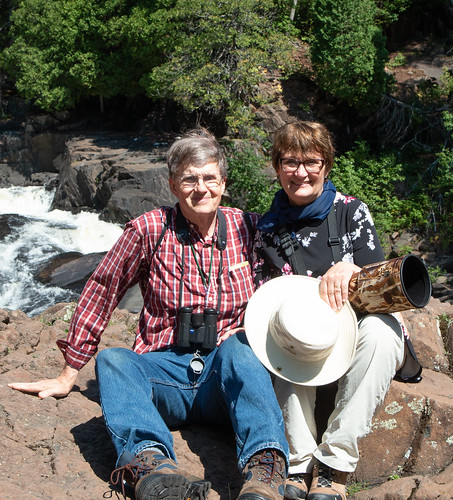Friday, March 18, 2022, was Russ’s and my fiftieth anniversary. That's two quarters of a century—makes a girl think!
For a couple to reach their golden anniversary requires that they start out while they’re still too young to have much of a clue about who they are and what they’ll be wanting out of life decades out, much less who their partner is and what they’ll want decades out.
When Russ and I got married, I wasn’t a birder. During our first three years of marriage, I was very much a homebody.
But then suddenly I was gone birding all day most Saturdays and Sundays; during spring, I was up and gone at 4 am weekdays as well. When Russ had a trip for work or we took an actual vacation, I couldn’t help but study the best birding spots at our destination. I dragged the poor guy to lots of sewage ponds and we once spent a memorable afternoon searching the Brownsville dump without luck for a Tamaulipas Crow. Oddly enough, Russ never complained even on these odoriferous excursions, and luckily, most birding spots are far more pleasant.
Fortunately for our family finances, I didn’t start photographing birds until I started working for a local optics company in 2005, and I didn’t buy my first DSLR camera and lens until I was working full time at Cornell in 2008. And speaking of that—I impulsively applied for that job the moment I saw the listing online, late one night after a glass of wine, and suddenly Russ’s wife was headed 1200 miles away, coming home for holidays and brief visits for the next two years. Again, he never complained.
Of course, marriages involve give AND take. When Russ’s mom developed a debilitating case of bursitis while living alone in Port Wing, Wisconsin, and Russ was busy with work, I stayed with her many days and nights for months. When she came to live with us, we gave her our bedroom and remodeled our bathroom to make it accessible. That was just before I was about to start a birding Big Year, and I had to downscale my plans enormously because we’d not budgeted for the bathroom and because one of us now needed to be home every day. But this was no bigger a sacrifice than all the ones Russ had made for me.
Back when I was 20 and Russ was 21, we couldn’t have anticipated any of this. Not only didn’t we know how we’d each evolve, we didn’t have a clue about what we’d be taking on when we had kids, how we’d deal with aging parents, how we’d deal with one of us developing an all-consuming passion for birds, or anything else. We jumped in with childlike faith and optimism as well as the feeling that we were mature beyond our actual years. Since then, we’ve had plenty of rough patches but always managed to recapture the best of ourselves and each other to pull through.
Not one of us, bird or human, can predict how our life will turn out. And as with birds, committing to one mate, whether for a season or a lifetime, is fraught with difficulties as well as loveliness.
The famous Laysan Albatross known as Wisdom has been nesting on Midway Island since at least 1956, but no one tracked her mates at all until around 2006, so we have no clue how many mates she’s had in her lifetime. The only thing we know for sure is that she’s had at least 2 different mates in the past 16 years.
Sixteen years is beyond the lifespan of any known wild robin, and many or most of them do not return to the same mate year after year even while they both survive. But while two robins are together, they have each other’s back. Several years ago, a pair established their territory in my backyard in early spring. It was a drought year, and after they paired up, they had to wait over a week for a supply of mud before the female could start building the nest. The day it finally rained, she made a good foundation in one of my white spruces and was starting to build up the cup when I heard a horrible racket. I ran out to find a Cooper’s Hawk on my neighbor’s lawn holding the screaming male robin in one foot. The struggling robin’s pectoral muscle was sliced to the bone and the hawk was starting to eat him alive while his mate got right in the hawk’s face screaming at it. Meanwhile, a couple of neighborhood crows waited a safe distance away, hoping to capitalize on the situation.
All this I took in in just a few seconds, but my opening the door and running out took the hawk by surprise and it flew off. Fueled by adrenalin, the dying robin ran under another spruce tree, the crows started making their move, and the female robin blocked their path, flailing her wings at them. Suddenly the hawk returned, darted under the tree, and grabbed the doomed male, this time dispatching him quickly and flying off to eat in peace.
I was heartbroken to lose this particular robin, who for years had done all his singing from atop my largest spruce. I was also sad for the female. She'd lost her mate and now all her hard work on the nest was wasted, too. But no—first thing the next morning, there she was, finishing up that very nest cup with a new male bringing her nesting materials.
This female had not only stuck by her first mate till death did them part but had fought for him as long as he clung to life. Now, spending days or weeks in mourning would have left her not only without her mate but also without a decent chance of successfully raising young that year. At this point, she probably had one and possibly even two fertilized eggs moving along her oviduct, so finding a new mate gave her the best chance of adding to her first mate’s genetic heritage as well as this new male’s and her own.
Those of us who get through the good and bad times together, year after year, owe a marriage's longevity to luck as much as anything. Instead of droughts, storms, and territorial competitors, we humans face financial struggles and setbacks, and all kinds of family strife. Instead of Cooper’s Hawks, we face heart attacks, cancer, other diseases, tragic accidents, and other dangers. Most marriages don’t last 50 years not because most couples aren't loving and loyal enough or don't deserve it, but because death intervenes.
Luck is neither deserved nor undeserved—it just is. So far, Russ and I are still hanging in there, and we still have each other’s backs. And that is the most joyful kind of luck there is.


